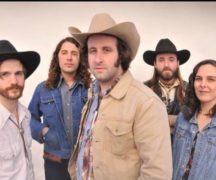By DAVID DUPONT
BG Independent News
The reggae band John Brown’s Body has hardly been molderin’ since its last appearance at the Black Swamp Arts Festival in 2003.
The band delivered a percolating set of reggae that had the crowd on its feet and dancing, and then the band’s horns joined the closing act Chubby Carrier for a raucous jam that had members of the audience dancing on the stage.
In the intervening years, says drummer Tommy Benedetti, the band has continued to evolve. “Any good band is on a journey,” Benedetti said in a recent telephone interview.
John Brown’s Body will perform on the Main Stage, Friday, Sept.9 at the festival.
For John Brown’s Body that evolution starts back in Ithaca, New York, with a band called The Tribulations, founded by Kevin Kinsella and Elliot Martin. Benedetti first heard them when he was a student at Berklee College of Music in Boston and became a fan. He then took over the drum chair in the band’s last year and a half.
DONATE $10 A MONTH TO THE NEWS
About 20 years ago, John Brown’s Body emerged from the remains of The Troubadours. The band took a “rootsier” approach. Kinsella was the main songwriter at that point. He wrote what Benedetti called “almost country reggae.” Tunes with strong harmonies and bridges that could easily be played just on guitar. But he also added the horn lines that are part of John Brown’s Body’s signature sound.
Those horns are and were an integral part of the band, Benedetti said. European promoters have approached JBB about touring with a smaller ensemble, but the band isn’t interested. They want their fans to get the full experience.
Benedetti said he recalls being disappointed in hearing some classic reggae outfits who replaced their horns with “cheesy keyboard sounds” for some live shows.
That full experience also means traveling with their own front of the house engineer. “He’s a part of the band,” Benedetti said. That means the band can deliver the full sonic experience heard on the records in live performance. “We always bring the full experience,” he said.
That sound went through a major change when Kinsella left the band in 2006, and Martin assumed the lyric writing duties.
“Elliot has a more futuristic, more cutting edge,” approach Benedetti said. “The band evolved into a little heavier, kind of edgier vibe. … It’s a lot more dubbed, heavy on the drums and bass. The rhythm is a little more complex, and each individual part is more thought out. The sonic palette draws on more beats, more sounds. We don’t have to adhere to the typical reggae beat, the typical reggae lyrics.”
Along the line, Benedetti said, they dubbed the term “future roots.”
“We’ll always have one foot dipped in the puddle of the greats, but it’s our duty as musicians here to take it and put our own stamp on it.”
That includes the world view of Martin’s lyrics. They retain an awareness expected of a band that takes its name from a radical 19th century abolitionist. “He does touch on topical stuff, political stuff to be sure, fairness and inequality.”
And he writes about historical events, like the song “Dust Bowl.”
While Benedetti said he’s reluctant to speak too much of Martin’s intent, he does know “he doesn’t like jamming things down people’s throats, being too obvious, being too preachy.”
Then Martin will sometimes address “the musical vibes at the dancehall, about bringing the music with the right vibe and no fanfare for the right reasons, the music the way it used to be.”
Benedetti said that bringing that message to an all ages crowd like that at the Black Swamp Arts Festival is a joy.
“We’re not alienating anybody with our sound and lyrics. We want everybody to enjoy and feel the vibe.”





